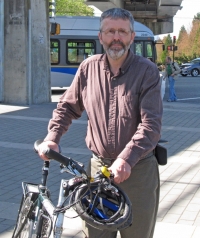Something subtle but important has shifted in the climate of B.C politics.
Early in the April 29 televised leaders’ debate, B.C. NDP leader Adrian Dix addressed climate change, not as an environmental issue for the consideration of future generations, but as a present-day economic and social issue.
Dix talked about how people in interior communities are already losing jobs because of trees killed by the pine beetle, which is directly linked to rising temperatures. The fact that the fossil fuel industry is already devastating the interior forestry sector is starting to sink in.
In Vancouver, where I live, it is possible to think of rising carbon levels in the atmosphere as a future environmental issue, but in rural B.C., it is a different story.
Burning fossil fuels, such as oil and coal, has already made B.C. sea water so acidic that oysters cannot reproduce. Oyster farmers now have to raise oysters in tanks of treated water until they are old enough to survive the acidic ocean water. Again, this is an immediate economic issue which primarily impacts people in smaller B.C. communities.
The near-term prospect of sea water so acidic it won’t support commercial shellfish operations is already casting doubt on the wisdom of investing or starting a career in the shellfish industry. The economies of coastal communities are already being eaten away by the carbonic acid formed when carbon dioxide mixes with water.
Framing this as a “jobs versus environment” issue does not hold much water anymore; the biggest threat to livelihoods in B.C. now is the carbon pollution from burning fossil fuels. Pipelines, tankers, and plants to liquefy fracking gas are direct threats to forestry and fisheries jobs.
If we want fisheries and forestry, it is now essential to expand renewable energy sources to displace fossil fuels. Renewable energy such as wind power is now cost competitive with extreme fossil fuels such as tar sands oil, and blocking off the fossil fuel path is essential to opening the way to energy jobs that are compatible with forestry jobs.
Another part of the oil-dependant infrastructure of the past that needs to be blocked is freeway expansions, such as the multi-billion dollar replacement of the Massey Tunnel proposed by the provincial Liberal government. Instead, we need to be investing in the future, which includes electric public transit and trains. Numerous studies rate public transit as one of the best green jobs strategies. For example, the B.C. Treasury Board estimated that $1 million in transit expenditures creates an average of 21.4 new jobs, compared to 7.5 jobs in the automotive industry, and 4.5 jobs in the petroleum sector.
By shifting to efficient transportation powered by renewable electricity instead of tar sands oil we can model and promote the changes needed globally. Vancouver is the largest city in North America without a downtown freeway, and its influence is global in terms of urban development and transportation planning. What Vancouver does is seen and sometimes imitated in major countries including the U.S., India and China.
B.C. is a crucial bottleneck in Big Oil and coal’s global push to expand fossil fuel extraction. The Enbridge and Kinder Morgan tar sands pipelines are the highest profile examples, but Chevron’s proposed Pacific Trail fracking gas pipeline to Kitimat is also of global significance.
Port Metro Vancouver also plans to greatly expand coal export facilities for low-grade U.S. coal and mostly higher-grade B.C. coal. Stopping these projects would bottle up a globally significant proportion of the fossil fuels that must remain in the ground to avoid catastrophic climate disruption.
People in B.C. have a greater opportunity to make a difference than almost any other group on Earth — and this means we have a greater responsibility to act.
By closing the door on the carbon intensive infrastructure of the past, we can protect existing jobs, including in the forestry and fisheries industries, and create new jobs that British Columbians can be proud of in their own communities. And we can make our communities healthier, more livable places while reducing the threat of climate disruption from burning oil, gas, and coal.
We are at a crucial crossroads, and it is very tempting to believe the tales of riches that companies like Chevron are telling. But the consequences of continuing down the fossil-fueled path are not “environmental” nor in the future.
The consequences of fossil fuel dependence are being felt by people in communities across B.C. today.
Adrian Dix has a good chance of becoming premier on May 14, partly because he has some credibility on climate as an economic issue rather than a classic environmental issue.
The much harder part will be after the election, when the fossil fuel companies and their friends in Ottawa will be pushing hard for continuing on the old carbon intensive path. Big Oil has a long history of squashing elected governments that stand in their way.
After May 14, a strong social movement will be needed to help shift B.C. onto the path to an energy future that won’t destroy forestry and fisheries.
If environmental groups are the only voices for climate action, B.C.’s rural economy will be cooked.
Eric Doherty is a Vancouver-based transportation planning consultant. He participated in developing the Green Jobs BC discussion paper Transportation Policy and Green Jobs in BC.
This article was originally published online in the Georgia Straight and is reprinted here with permission.




